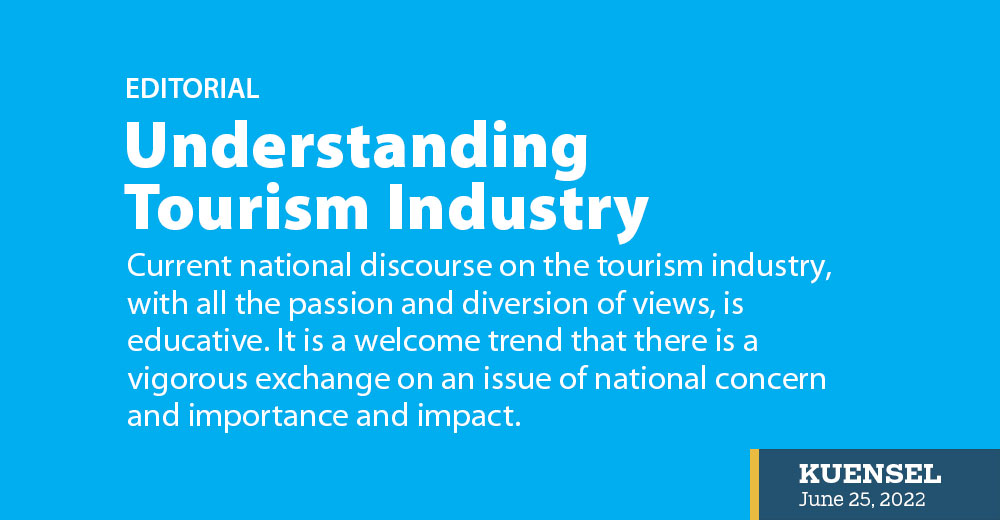Current national discourse on the tourism industry, with all the passion and diversion of views, is educative. It is a welcome trend that there is a vigorous exchange on an issue of national concern and importance and impact.
Of course, people are upset. Some of them might lose their businesses and some may need to change their careers. It is obvious from the views and arguments that, for some, it is about personal interests, which is understandable. For some, it is a general concern about an important issue, which is reassuring. And some are getting the message that Bhutan must aim high and must achieve those goals.
Emerging from the sometimes-heated debate are some illuminating perspectives on how we understand concepts. One is that we often distort the term “high-end”. For most people high-end tourism means wealthy visitors who stay in expensive luxury hotels. We forget that high-end refers to the destination, not the tourist’s bank account. It is the experience which includes the comfort of the stay, quality of services, and the excitement of seeing and learning about lives elsewhere.
This is why, when we suggest that the government invest in high-end tourism, we don’t mean building fancy restaurants and smooth roads. We mean improving the standard of education and health care, quality of transport infrastructure, managing waste – making life better. In the context of Gross National Happiness, it is the responsibility of the government to create the conditions that benefit both guests and hosts. Such conditions are created through infrastructure, the regulatory environment, and investment.
When a tourist says, “for $ 200 I can get a luxury hotel in Phuket,” it’s a verdict on Bhutanese hotels and services. It does not mean that we should lower our rates. It means that we should raise our standards. And, in today’s debate, we remember that tourism is more about the locale than the hotel.
We mean creating an environment where tourists and local residents can jog or stroll in safety, not bothered by antisocial elements or bitten by dogs. We mean quiet treks through pristine forests and not being swamped by the masses. We are also talking about the feel of a society at peace and people who are not intent on ripping-off guests. We are talking about a taxi driver or shopkeeper who takes the trouble of returning a bag left behind by a passenger or customer.
The new policy sets the stage for healthy competition among service providers. Bhutan can still aim for resorts where guests are served fresh vegetables from its own garden. When we talk about products, we are talking about what we ourselves eat and use and wear and hang on our walls. We want to elevate a market where our shops try to palm off cheap trinkets from India and Nepal as Bhutanese handicrafts.
Another issue is the perception of stakeholders in the tourism industry. Tourism is more than operators, agents, guides, hotels, and others who work in the industry. We are now reminded that Bhutan and all Bhutanese citizens have a stake in this industry. This important industry must benefit all Bhutanese, especially the sections of our population which enrich our identity. Communities like the Layaps and Brokpas and Doyas must be involved in the industry as beneficiaries and not be just photo opportunities.
Yes, we have to deal with the discomforts and stresses of change. But, hopefully, we are going through the teething problems of a new initiative to liberalise the Bhutanese tourism industry and introduce bold changes. There are many questions to be asked. While we don’t expect the average citizen to sacrifice all comforts in the interest of long-term benefits to the country, a simple way to look around us and ask ourselves: “Is this high end? What would happen if we don’t change things now?”


